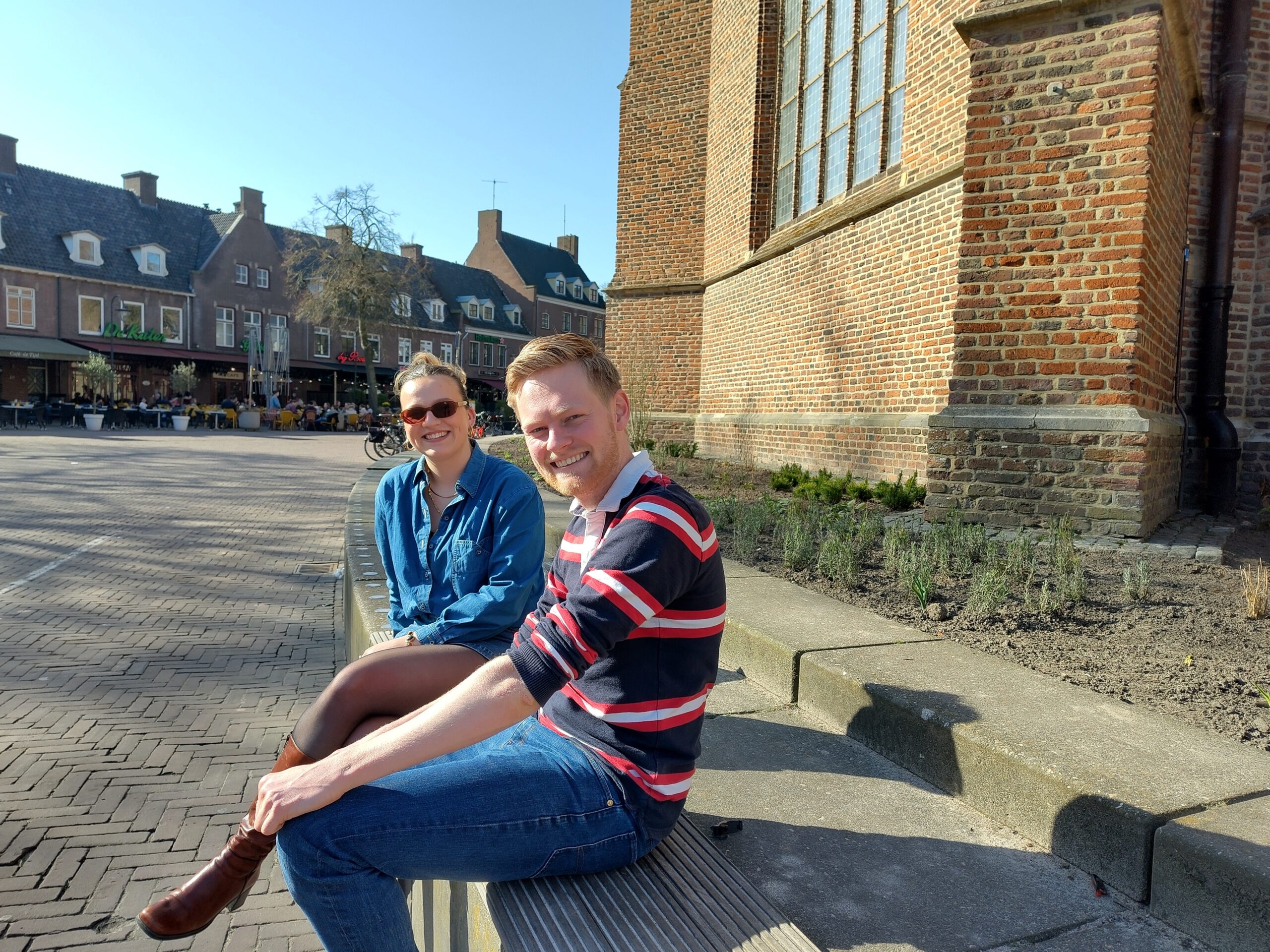Text: Femke Janssen. Illustration: Yvonne Kroese.
WUR places great value on collaboration, with group work a part of all degree programmes. And that can be quite difficult if you have to work with students with a shaky command of English. Resource talked to four students who run up against a language barrier. ‘I used gestures to try to explain what we had to do.’ Meanwhile, WUR is scrutinizing its language requirements for admission.
International students have to have a minimum level of English to be admitted to Wageningen University. Several test results are accepted as evidence of that level, including the TOEFL, IELTS and Cambridge testing systems. All these exams include reading, listening and speaking components. There are minimum scores for each component, and Bachelor’s and Master’s degree courses require different scores for admission. But there are ways of passing such tests without really having English under your belt, which means there are students walking around Wageningen with only broken English, says Master’s student John Doe *:‘Research is just about doable then, but writing and collaborating is problematic.’ So students feed entire lectures into Google Translate in order to understand something at least. The problem is so big that Doe reckons there are students who get other people to write their theses because their own English is not good enough.
Cultural differences
Dean of Education Arnold Bregt doubts whether students get other people to write their theses. ‘There is very intensive supervision during the process of writing a Master’s thesis, and I can’t imagine that students can get someone else to write their thesis without their supervisor noticing.’
Some students paste entire lectures into Google Translate
As Dean of Education, Arnold Bregt is involved in the recruitment policy on English language skills. He admits that it is possible that some students find ways of getting admitted without really meeting the criteria. He finds it hard to judge the implications of Doe’s stories, though. ‘When can you really call something fraud, and when it is a smart approach to learning? There are often a number of factors that complicate communication, and cultural differences play a role too.’ According to Bregt, it is rare for a student to have absolutely no English. ‘In the 18 years that I’ve been teaching, I’ve only had a couple of students who really couldn’t speak English at all. I advised them to take a couple of months off to immerse themselves in the English language. They did that, and have since passed.’
Evaluation
Bernadette Dijkstra is involved in course evaluations as a policy advisor on Educational Quality. She agrees that the different levels of English among students is an issue. ‘Last year several degree course visitations mentioned the level of English as one of the differences between the students coming in to do a Master’s. But you can’t tell from the course evaluations how often those differences are really problematic.’ That is because the current course evaluations do not include specific questions about a student’s experience of communication in group work, but focus on their evaluation of how the course is taught. Dijkstra: ‘The focus lies on aspects such as the method, materials and testing. Aspects the teacher can have an influence on next time around.’
There is no procedure for course teachers on what to do about students whose spoken and written English is inadequate. Some teachers acknowledge the problem but do not wish to talk to Resource about it. It seems to be a sensitive topic. Bregt thinks it is important to discuss it openly because criticism paves the way for improvements. The dean takes the stories that are circulating seriously, even if they are not backed up by data. Together with colleagues, he is doing the rounds in WUR – consulting the AID committee among others – to find out about students’ experiences in this area.
Measures
Although there is no solid evidence that the level of English among international students causes problems, there are already plans for revising the current admission requirements. According to Bernadette Dijkstra, WUR will investigate where the language requirements suffice and where they do not – and what exactly the problem is in these cases. And what are the requirements at other universities? Dijkstra: ‘We will also look at whether we should adjust the language requirements themselves or, rather, the way we establish whether a student meets them. And what are then the consequences for access to our education, the costs for applicants, etc? It’s complicated,’ says Dijkstra.
The first measures for improving students’ level of English have already been installed. A ‘skill set’ has been compiled for Bachelor’s degree programmes, with Academic English listed as a skill in its own right. The idea is that students should be actively trained in this during their Bachelor’s programme. ‘We are still thinking about how we are going to implement this,’ says Dean Arnold Bregt. Thought is also being giving to Master’s students and others who come in with too low a level of English: ‘We are looking at applications more critically and if in doubt, we ask to talk on Skype. Usually that quickly makes clear whether someone has the minimum level.’
It’s incredibly hard for students who don’t speak good English
Bregt is also open to offering English classes in the summer months, a suggestion from students. ‘It’s incredibly hard for the students themselves if they are not fluent in English. We should make these classes open to everyone, because there are also Dutch students and teachers who have difficulty with English.’ Wageningen in’to Languages is an organization that can provide support for this. Irene Houkes-Jansen, head of In’to Languages: ‘We can help to organize a course to improve students’ intercultural skills and proactive English language skills.’
Bregt thinks the students have a responsibility too, to discuss problems with their teacher or supervisor. ‘I think it’s important for students and teachers to discuss the problems they come up against. Only then can something be done about it. It is always possible to talk to course coordinators or even the rector, if necessary. Open communication is the first step towards improving matters.’
‘Explaining things using gestures’
Tim van Nes (22), MSc student of Environmental Sciences‘
During one class we had a group assignment to do and I ended up in a group of all international students. I’m a native speaker of English, so they all looked to me for help. In the end I spent the whole class using gestures to explain what we had to do. We didn’t even get round to actually working on the assignment.
I’m not the only one this has happened to; I’ve heard from others that they have to deal with fellow students who can hardly speak any English. I’ve heard from some students from eastern European countries that speaking skills were not part of their English test. And that holds them back when they come to Wageningen, where group work is so important.
Maybe WUR should offer English classes for the whole month of August, before classes begin. That way students could get used to the academic level of English that is expected of them.’
‘Lectures via Google Translate’
Zoë van der Heijden (22), MSc student of Nutrition and Health
‘At the start of the academic year I had a supervisor on one course who could make himself understood pretty well in English, but his grammar was all over the place. In the next period there was a student in my group who had trouble with English. He said so himself. That is not nice for him, but it’s not nice for the rest of the group either, because they have to take over a lot of work.
At lectures there are students who copy entire PowerPoint slides and paste them into Google Translate. That shows that some students really struggle with the level of English. It is important that WUR looks into this. Maybe the admission requirements could be raised or students could get extra language tuition if they can’t cope with the level.
‘Extra work for the rest’
Naomi van den Berg (24), MSc student of Forest and Nature Conservation
‘It’s happened to me several times that someone in my group couldn’t really contribute to our project right from the start, because of the language barrier. Often that becomes clear pretty soon, but it is not easy to talk about it openly. As a group, we tried to make sure everyone could keep up, by checking several times whether everyone understood everything. You try to make decisions and divide tasks together. And then you check one more time whether everyone knows what is expected of them.
Unfortunately, it has happened a few times that someone still didn’t do what had been agreed on. Then the rest of the group has to take over that person’s work at the last minute. That is difficult for the person who can’t keep up, and for the rest of the group too, who have to do extra work at the last minute. And in the end, group work is assessed as a whole: everyone gets the same grade.’
‘I just sat there in silence’
John Doe * (26), MSc student
‘When I started in Wageningen I had a very hard time with the level of English. I could follow the lectures to some extent, but the group work was difficult. Because I couldn’t express my ideas properly in English, I just sat there in silence. I felt ashamed. A one-to-one conversation went better, so I tried that, sometimes using Google Translate. I had to think hard about every sentence I spoke.
Group members have to evaluate each other, and I got low grades. That was terrible for me. I got the feedback that I should talk more and louder. The others talked very fast, so I couldn’t follow them very well. But I did want to contribute. We agreed that if I put up my hand, they would listen quietly to me. But in the end, decisions were taken by the rest and I was told about them afterwards. I’m a sociable person and I like group work. If my English had been better, I would have participated much more actively. But I couldn’t do that then.’




